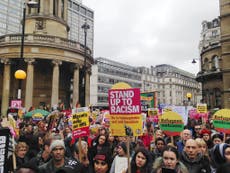The Government still has a long way to go when it comes to tackling racial discrimination
The first part of finding solutions to any problem is to discover its scale and nature. There’s obviously been much progress there. The second stage is to find explanations

In July of last year, in what seems like a lost political age, the then new Prime Minister Theresa May stood at a lectern in Downing Street and using her newly acquired authority made a speech that surprised many, because of how candidly she spoke about race discrimination.
Now she has delivered at least an early instalment in fulfilling her pledge to fight such “burning injustices” with a comprehensive audit of the way public services treat people from different ethnic backgrounds. Ms May has taken the opportunity to demand that schools, hospitals, prisons, the welfare system and the rest of the public sector must “explain or change” the discrepancies and anomalies that the figures have highlighted.
Although this is more of a compilation exercise in mostly already published data, a gathering of all the information in one survey helps build a “big picture”; a sense of the whole.
There are few surprises, if truth be told; as Ms May herself said in her inaugural address last year, we have long known that if you’re black you’re treated more harshly by the criminal justice system than if you’re white, and that if you’re a white, working-class boy, you’re less likely than anybody else in Britain to go to university.
Thanks to this exercise, we should also be aware that Black Caribbean pupils are three times as likely to be excluded permanently from school than their white British fellow pupils, and that nine out of 10 children from gypsy or Roma families fail to reach expected standards of literacy at age 11, blighting their already diminished life chances. A depressing, if familiar or predictable, picture then – yet to be reminded of it is important, and a spur to action.
At a time when Government is understandably preoccupied with Brexit and the economy, it is laudable that the Prime Minister has taken the time to return to this aspect of her personal political agenda so conscientiously. She should be held to her promise to challenge every department and agency of the state to “explain or change” its performance on race, including ensuring that white working class boys, and girls of Pakistani or Bangladeshi heritage, respectively, are able to share more fully in the opportunities that society should offer them.
What might help these bodies fulfil their duties is to repeat the audit on an annual basis, and to add to it details of, for example, the pay gap between different ethnic groups (and the statistical teams are to be thanked for ensuring that important contextual differences, for example between Black Caribbean and Black African communities, are accounted for). The audit should also be extended to the private sector, as with the gender pay audits now mandatory for larger employers. There is still much to find out about the way race dictates people’s lives in contemporary Britain.
The first part of finding solutions to any problem is to discover its scale and nature. There has obviously been much progress there. The second stage is to find explanations – as the Communities Secretary Sajid Javid suggested, for example, we need to understand whether women of Pakistani heritage not speaking English as widely as others is a matter of choice, culture or something more sinister. Third, action needs to be taken, even beyond existing legislation.
It is not too early to consider, in the context of these findings, measures such as positive discrimination, tougher sanctions on employers who operate unfair practices, or shifting the burden of proof onto companies and public bodies to show that they are not discriminatory. Burning injustices will not be extinguished merely by spraying them with official stats.

Join our commenting forum
Join thought-provoking conversations, follow other Independent readers and see their replies